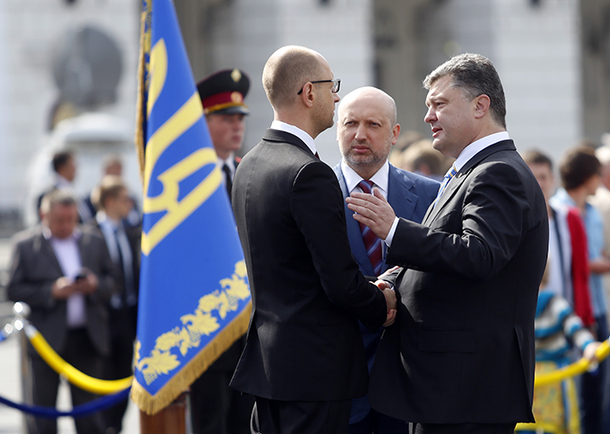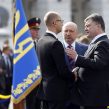
Ukrainian Leaders Walk Away From Law on Self-Administration in Occupied Territories
Publication: Eurasia Daily Monitor Volume: 11 Issue: 167
By:

Utter confusion surrounds Ukraine’s just-adopted law on the “special procedure of local self-administration in individual districts in the Donetsk and Luhansk provinces.” Pursuant to the September 5 ceasefire protocol, President Petro Poroshenko initiated this law, his administration drafted it, and the parliament adopted it on September 16 (see EDM, September 19).
However, the law has not yet taken effect, and it seems increasingly doubtful that it ever will, even if only on paper. The government led by Arseniy Yatsenyuk opposes key parts of this law publicly and disclaims any role in having drafted it. Top officials including the president (see below), several of his senior advisors, and the parliament’s chair, are backtracking on the adopted law, disavowing or reinterpreting various parts of it, or calling for the withdrawal of Russian troops from Ukraine’s territory as a novel pre-condition to implementing this law.
Adding to the confusion, many journalists misread this law as a “special status” for Donbas, or for the Donetsk and Luhansk provinces, or even for those two “people’s republics” (“DPR” and “LPR”). In actuality, the law carefully stops far short of any such implications (see EDM, September 19). The Right Sector threatens yet again to riot in Kyiv, and the far-right group’s spokesman Artem Skoropadsky has warned that Poroshenko’s presidential term might be brought to a premature end “if he continues like this” (UNIAN, September 20).
With parliamentary elections due on October 26, partisan politics affect the public debate on this law. Yulia Tymoshenko’s Batkivshchina (Fatherland), Oleh Tyahnibok’s Svoboda (Freedom), and other parties criticize the law publicly (although, as reported from the closed-door parliamentary session, most of Batkivshchina’s and Svoboda’s deputies abstained from voting, rather than voting against this law). Apparently, the pro-presidential bloc worries about losing some votes on that flank, which also includes Oleh Lyashko’s ascendant Radical Party.
The multiplying points of contention in this law include: procedural irregularities in parliament; ambiguity about the Russian troops occupying parts of the Donetsk and Luhansk provinces; local elections to be held in the occupied areas; and the local authorities’ relations with the Ukrainian government and with Russia, respectively. Russia is forcing (while the West is accepting) the partition of these two provinces of Ukraine. The law on the special procedure of local self-administration would apply to the Russian-occupied areas. It refers generically to “districts,” below the province level.
· Irregularities in parliament: The Verkhovna Rada’s (national parliament’s) chairman, Oleksandr Turchynov, refuses to sign the adopted law, on suspicion that the published text may have been tampered with after the vote in parliament. The published text states that the precise geographical area of applicability of this law shall be defined in detail by the head of the Anti-Terrorist Operation (ATO) Center of Ukraine’s Security Service (SBU). Indeed, the law specifically applies to the occupied districts, euphemistically referenced as the “ATO Area” in this case. However, according to Turchynov and others, the text approved in parliament states that the parliament itself, not the ATO Center, would define the precise geographical area of applicability of this law. Turchynov wants the parliament to retain that power; and presidential advisor Mykola Tomenko supports this. Pending elucidation of possible irregularities, Turchynov would not forward the law for President Poroshenko’s signature (Ukrinform, September 18, 21).
· Russian troops: Presidential advisor Ihor Hryniv initially suggested that this law along with the amnesty law are pre-conditions to the withdrawal of Russian troops from Ukraine’s territory. Hryiniv and other Ukrainian officials seemed to hint that Russia had informally agreed to this particular sequence when signing the ceasefire on September 5 (Ukrinform, September 16). Such Russian consent looks implausible, however. Meanwhile, Poroshenko’s political advisor, Tomenko, asserts that this law “can only begin to operate when the last Russian soldier departs from these districts, and the ‘DPR and LPR’ lay down their arms” (UNIAN, September 18, 21). This is the reverse of the initially suggested sequence, and would imply a postponement sine die.
· The “districts’ ” relations with Kyiv and with Russia, respectively: According to the adopted law, Ukraine’s Cabinet of ministers and other central executive authorities may enter into agreements with these local self-administration bodies to resolve economic, social and cultural matters. Intentionally or inadvertently, this would imply horizontal relations incompatible with the unitary state, and (on this point only) a hint at a “special status.” At the same time, Kyiv authorizes these local bodies to “strengthen and deepen good neighborly relations with administrative-territorial units of Russia, based on agreements on cross-border cooperation, and within the limits of their legal competencies” (Ukrinform, September 16). Such district-to-district (or city-to-city) cross-border relations are a modest version of Russia’s proposal for direct relations between whole provinces of Ukraine and Moscow, bypassing Kyiv (a feature of Moscow’s “federalization” projects for Ukraine). This part of the Ukrainian law looks like a slippery step in that direction. Moreover, “cross-border cooperation” is hardly a viable concept when Russian and proxy troops control the Ukrainian side of the Russia-Ukraine border, deep inside what is legally Ukraine’s territory, along most of the length of that border in the Donetsk and Luhansk provinces.
· Local elections: Under this law, pre-term elections to district, city, town and village councils are to be held on December 7 in the Russian-occupied areas. However, Prime Minister Yatsenyuk has argued that legitimate elections can only be held under the aegis of Ukraine’s central and local electoral commissions and in line with international standards. Kyiv’s approval of elections in those areas at this time would only “legalize the bandits, which we will not allow,” Yatsenyuk declared (Ukrinform, September 17). And according to Justice Minister Pavlo Petrenko, “What kind of elections can possible be held in territories controlled by Russian gunmen?” (Ukrinform, September 20). Poroshenko has apparently re-thought the issue: “Elections can only be held [in those areas] where the gunmen are no longer in the streets. Otherwise, nobody will recognize the outcome of those elections” (Ukrainian TV Channel One, September 21). Thus, the law’s December 7 election date turns into another sine die.
The president seems to have backtracked on other parts of the law also. Poroshenko told the country on television (September 21) that the “people’s police,” foreseen by this law in those districts, must operate within Ukraine’s legislation and jurisdiction. This law omits those criteria, however, leaving wide scope for abuse (see EDM, September 19). This law also mandates Ukrainian budget funding on an entitlement basis to finance post-conflict reconstruction in occupied districts. Poroshenko now accepts that Ukraine’s state budget cannot and should not finance districts that are not under Ukraine’s control. Instead, Kyiv will seek to enlist international donor funding to help those districts (Ukrainian TV Channel One, September 21).
Poorly drafted, hastily adopted, and discussed in an agitated political atmosphere, this law seems to be stillborn. Technically, it needs to be counter-signed by parliament chairman Turchynov, then signed by president Poroshenko, and finally published by the government, in order to enter into force. These steps seem unlikely to occur until after the parliamentary elections, if then; and even then with revisions that could return the process to square one.




